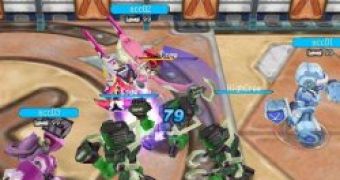With the gaming market evolving, publishers strive to come up with better payment schemes as standard means of selling video game titles to become obsolete. The latest trend involves marketing games by an improved MMO model, not as finite products to own, but as services. We find out more via Next Generation, directly from the horse's mouth at Acclaim and NHN.
Acclaim took the first step in this direction with the recently launched Korea-based NHN license called BOTS. It's still their first online title, but henceforth, micro transactions will be an important revenue stream, along with in-game ads. This model works wonders for casual players, and Acclaim readied a monthly subscription for hardcore gamers as well. In effect, they are setting up multiple payment methods to better suit the customer's playing style, lining up habit with revenue streams.
Acclaim CEO Howard Marks commented that "Buying the 'whole thing' is not an option, because we are a service. I think a lot of people don't understand [the difference between] a game sold as product, and a game sold as a service."
In the same line of thought seems to be NHN's US branch, with this week's launch of the ijji.com beta. The site is tagged as "the serious to the social to the casual gamer", further extending the company's success in Asia with Hangame, Hangame Japan and China's Ourgame as sister sites that already proved the franchise's viability. Opposed to Acclaim's focus on a narrow segment of gamers, NHN wishes to address a wider audience since their titles range from board games to full-featured strategy games, and even an upcoming FPS.
"The best developers in Korea came together to make our FPS game using our business model," said Tae-Sik Moon, CEO of NHN USA. "Although it is 'free' to play, this model has been successful in Asia. A great deal of resources was put into the development of this game to ensure it would succeed within this item based sales model." He added "Currently, the US has that stigma, but our games are different and will challenge that line of thinking. Our FPS game, that we intend to launch later this year, has proven itself wildly successful in Asia. Prior to its entry into the Korea, Counter-Strike used to be the number one FPS."

 14 DAY TRIAL //
14 DAY TRIAL //